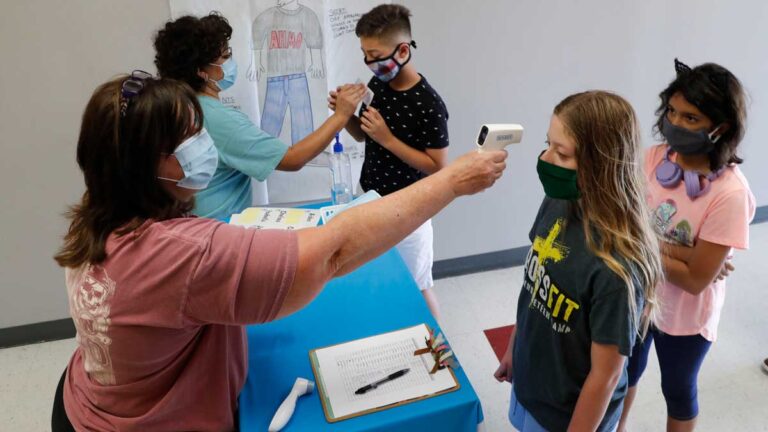URBANA – With summer camps on the horizon, the U.S. Centers for Disease Control and Prevention issued updated guidance and recommendations on April 24 for preventing the spread of COVID-19.
Among them: mask-wearing, spacing out three to six feet apart, good ventilation and being outdoors as much as possible.
“They also now recommend that all of the adult staff be fully vaccinated before the camp starts, if at all possible, and the unvaccinated staff should be tested regularly,” says Becky Smith, an epidemiologist at the University of Illinois at Urbana-Champaign. “Those guidelines are very similar to what they have for schools.”
Since children under 16 aren’t yet eligible for the COVID-19 vaccine, that can complicate decision-making about summer camps. While fewer children have gotten sick with COVID-19 than adults, kids can still get the virus and spread it to others.
But for some kids, the social isolation and other stressors of the past year have been devastating, taking a toll on their mental health; for them, in-person camp could be beneficial.
“Youth and summer camps can play an important role in the lives of children, including supporting their social, emotional, and physical development,” the CDC guidance states. “Camps provide opportunities for children to try new activities, develop relationship and social skills, and be physically active.”
Smith says if the child is independent and seems happy doing their own thing, keeping them home could make sense, if that’s an option.
“But if you have a kid who’s extremely social and just needs the social interaction, then you might lean more towards finding a camp that works for them,” she says.
When thinking about day camp versus overnight camp, the level of risk will depend on the steps camp operators are taking to keep the virus out — and if it enters, to stop it from spreading.
“[At] sleepaway camps, testing can be done as a biosecurity measure… to keep the disease out. So once everybody gets there, if nobody’s leaving the site, as long as COVID didn’t come in with them, then they’re in good shape,” Smith says. “So the question is, can you find it all before everybody comes in?”
Smith says the safest bet is to have everyone get a COVID-19 test before they leave home for overnight camp. Then, the CDC recommends follow-up testing should be conducted after everyone arrives.
“If you’re there for a few weeks, wait four or five days before you do the post-arrival test,” she says. That will ensure any latent cases of COVID-19 that weren’t identified in the first round of testing will be identified.
The situation is looking a lot better this year compared to last summer, Smith says, thanks to many adults getting the vaccine, as well as better access to coronavirus testing.
“At this point, anybody 16 and up has access to the vaccine, and there are vaccine appointments available all over the state,” Smith says. “If the staff is fully vaccinated, that’s added a level of protection that just was not available last summer.”
In addition to better access to testing and vaccines, Smith says, scientists and public health experts have a much better understanding about the virus and how it spreads.
“So we know that the risk outdoors or with high-ventilation areas is much lower, and with camps, a lot of time is going to be spent outdoors… whereas before when we weren’t sure how much of [the spread of the virus] was aerosol, versus airborne, versus contact, we couldn’t make those risk calculations.”
Every family will have to make their own decision about how much risk they are able to tolerate.
“That’s unfortunately the case for everything in this pandemic,” explains Smith, who says that in her own household, her one child stays home and the other has been in daycare.
“My older child can handle staying home and entertaining herself and my younger child cannot,” she says. “So we make those decisions as we can.”
Christine Herman is a reporter at Illinois Public Media. Follow her on Twitter: @CTHerman

